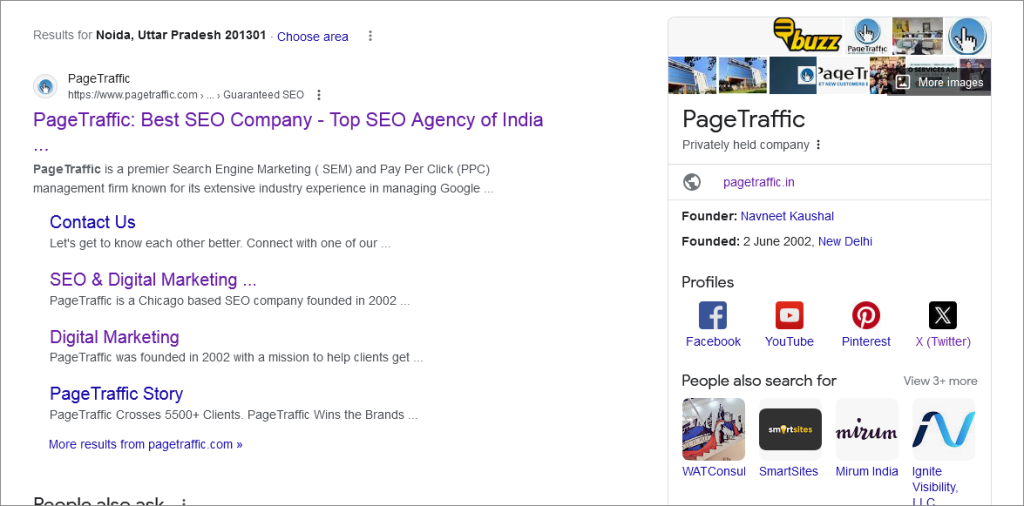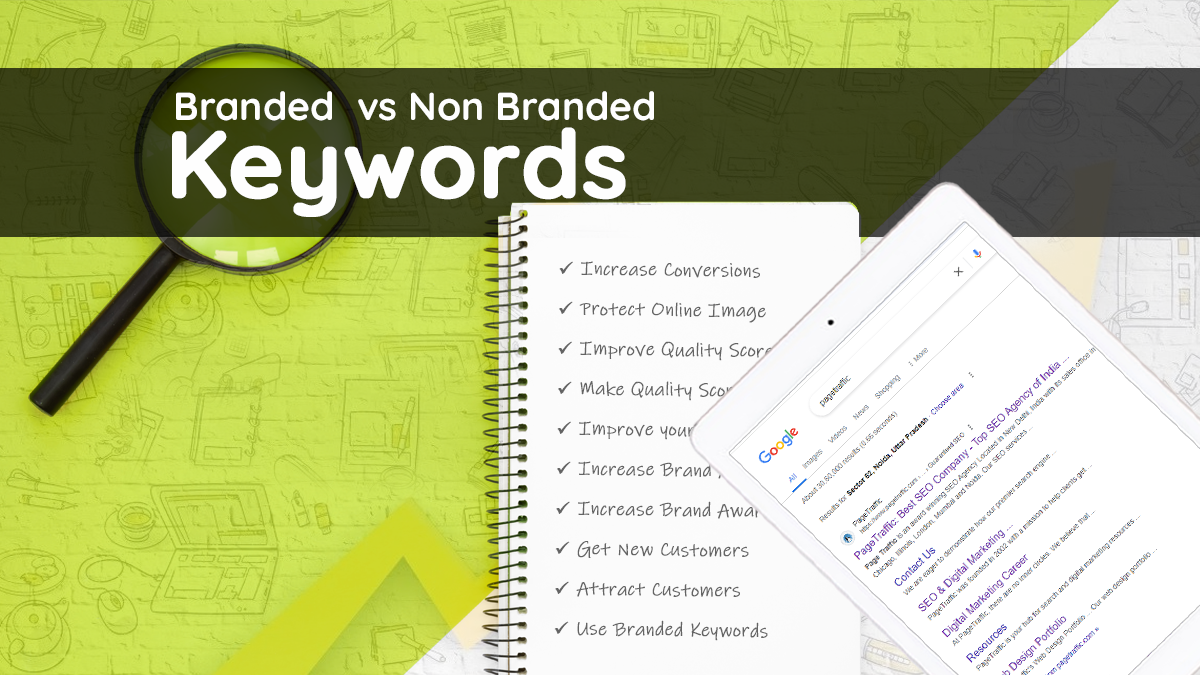In digital marketing, the strategic use of keywords – from avoiding certain terms in advertisements to focusing on a single significant keyword in each ad group – is crucial for success. Conducting extensive keyword research before launching campaigns is essential. Monitoring the performance of these keywords and continually seeking new opportunities is equally important.
During your research, you’ll likely encounter terms related to your business that fall into two categories: branded and non-branded keywords. Many marketers grapple with determining which type is more beneficial for their advertising efforts.
It’s a common misconception that branded and non-branded keywords are diametrically opposed. In reality, utilizing both types in tandem can enhance your campaign results more effectively than using them in isolation. Understanding the distinction between these two keyword types is particularly vital for pay-per-click (PPC) advertising.

Keep in mind that your competitors might use your branded keyword terms in their ads.
However, both branded vs non-branded keywords play a significant role in your overarching online marketing strategy. They also contribute to improving your search engine rankings. This post explores the functions of both branded and non-branded keywords, used together and individually, and offers strategies for their effective implementation in your campaigns.
What are Branded Keywords?
Branded keywords incorporate your company’s name. For instance, any keyword that includes “Nike” is deemed a branded keyword, regardless of the other words it’s paired with. Keywords featuring other brand names don’t qualify as your company’s branded keywords. This distinction is crucial, especially for retailers selling products from multiple brands.
Take Zappos, a well-known shoe retailer, as an example. While terms like “Zappos shoes” and “Zappos reviews” are branded for them, phrases such as “Nike sneakers” and “Adidas sandals” are not, despite Zappos selling these products.
Such keywords refer to specific brands but aren’t exclusive to one retailer. Searches for these terms don’t necessarily indicate an intent to purchase from or learn more about your brand, but rather a general interest in a product available from various sellers.
Conversely, searches including your brand name suggest a direct interest in your company, indicating that these individuals are likely familiar with your product offerings.
SEO experts skillfully blend branded and non-branded keywords to maximize their clients’ online visibility and engagement.
What are Non-Branded Keywords?
Non-branded keywords are phrases that describe your products or services without including your company’s name. Examples like “digital marketing agency” and “SEO services” represent significant keywords not tied to a specific brand. These terms are commonly used by potential customers interested in your offerings but don’t explicitly mention your brand.
Your strategy will likely encompass a broader range of non-branded keywords compared to branded ones. This is due to the vast array of keywords your audience might use when seeking information relevant to your business.
Branded vs Non-Branded Keywords
Branded keywords incorporate your company or product name. Conversely, non-branded keywords refer to your business or products without using their specific names.
For illustration, consider Skimmer Drones. Phrases like “Sky Skimmer products”, “drones by Sky Skimmer”, and “the Sky Skimmer line of drones” fall under branded keywords.
In contrast, general search terms like “best drones”, “top drone companies”, and “aerial photography” are non-branded, as they don’t specify a brand.
A key distinction in organic search between these two keyword types lies in their reach potential. Branded keywords target individuals already familiar with your brand, while non-branded keywords aim to attract people searching for similar companies or products.
When individuals search for a specific brand on Google, they are typically seeking that brand’s specific products or services, as opposed to general keyword searches that may attract a broader audience. However, branded searches are often more likely to result in sales.
It’s crucial to balance your keyword research between non-branded and branded terms. This approach can boost search traffic and draw more visitors to your website.
Over time, both keyword types contribute to evaluating your overall SEO performance and can enhance revenue by attracting both new and existing customers. Note that if a keyword includes a brand name but is commonly used across various brands, it is categorized as non-branded.
Which Provides Better Results – Branded or Non-Branded Keywords?
A common dilemma in digital marketing, particularly in Pay-Per-Click (PPC) campaigns, is determining whether to prioritize specific brand names or general keywords. This decision often hinges on the distinct costs associated with each keyword type.
Both branded and non-branded keywords play vital roles in SEO and PPC campaigns, catering to different search intents and appealing to potential customers at various stages of the purchasing journey.
For example, let’s consider a comparison between the search terms “running shoes” (non-branded) and “Nike running shoes” (branded) using Google’s Keyword Planner for ad campaigns. This comparison can help us understand which keywords might be more beneficial in terms of visibility, competition, cost, and conversion potential.

Visibility – Non-Branded
To attract new customers, it’s advantageous to target widely searched keywords. Emphasizing popular non-branded keywords can increase the visibility of your ads, provided your bids are competitive enough.
In terms of search volume, more individuals might see ads for ‘running shoes’ compared to “Nike running shoes”. Utilizing non-branded keywords is an effective strategy for enhancing your website’s discoverability on search engines and introducing your brand to a broader audience.
Competition – Branded
The competition level for a keyword in Google’s Keyword Planner reflects the number of advertisers bidding on it. A keyword with high competition can be more challenging and costly to rank for.
Non-branded keywords often face stiff competition since many companies target them. While numerous businesses might vie for these generic terms, having a unique brand name can be advantageous.
However, it’s important to be aware that competitors may bid on your branded keywords in online searches to capture your potential customers. This tactic is more prevalent in highly competitive industries and should be considered when strategizing your PPC campaigns.
In summary, both branded and non-branded keywords have their respective strengths and should be balanced strategically in digital marketing campaigns for optimal results.
Price – Branded
Branded keywords often come with a lower cost-per-click due to less competition. When a few companies are competing for a specific keyword, advertising costs can be remarkably low, sometimes just a few cents per click. For PPC campaigns with budget constraints, branded keywords offer an economical choice with their lower cost per click.
Also Read: 10 Important SEO Benchmarks You Need to Know in 2025
Conversions – Branded
The ultimate goal of marketing is to drive sales and generate revenue for your company. Therefore, focusing on keywords that lead to high conversion rates is crucial.
In PPC campaigns, branded keywords typically yield higher conversion rates compared to non-branded ones. When comparing two separate campaigns—one for branded and the other for non-branded keywords—the branded campaign often performs better.
It’s essential to recognize that users searching with branded keywords are usually closer to making a purchase decision. They might have already conducted research, visited your website, and are familiar with your products.
Although these users might convert after seeing a branded ad, their initial awareness of your company could have originated from a non-branded search. This doesn’t diminish the effectiveness of branded campaigns; rather, it highlights the importance of a combined strategy utilizing both branded and non-branded keywords.
Branded and Non-Branded Keywords Working Together
In PPC marketing, leveraging generic keywords is crucial for attracting website traffic and maximizing returns from paid ads. However, achieving top search result placement and outperforming competitors can be challenging without incorporating branded terms.
Forbes reports that only 10% of searches specifically target brands, with the remaining 90% being informational or transactional. Interestingly, searches related to a particular brand are twice as likely to result in a purchase compared to non-specific searches.
Utilizing both branded and non-branded keywords allows you to engage various customer segments at different stages of the buying process. While popular keywords often face greater competition and higher CPC, they might not always lead to immediate sales.
Non-branded keywords are valuable for increasing brand visibility and attracting new customers. Ads with non-branded keywords target individuals at the start of their buying journey, while branded keywords are more effective at closing sales. This synergistic approach is akin to the collaborative efforts of a sales and marketing team.
Deciding the Time to Use Branded and Non-Branded Keywords
Incorporating both branded and non-branded keywords is an effective strategy for enhancing your SEO and should be a key element of your SEO plan. However, the role of these keywords in PPC campaigns is often debated among marketing experts, with some questioning the value of using branded keywords in these campaigns.
Contrary to the belief that people familiar with your company and products are unlikely to search for them, data from Google’s Keyword Planner indicates that branded terms are indeed searched, albeit less frequently than non-branded terms. Therefore, it’s vital to strategically time the use of branded and non-branded keywords in your PPC strategy, aligning them with your specific marketing objectives.
When Should You Use Branded Keywords?
Branded keywords play a crucial role in a robust marketing strategy. Here are scenarios where they are particularly effective:
To Increase Conversions Without Much Spending
Although branded traffic is typically lower in volume compared to non-branded traffic, as it targets a narrower audience, this can be advantageous. Targeting ads to individuals already searching for your products increases the likelihood of conversion, given their existing interest in your brand.
Moreover, the cost-effectiveness of branded keywords often surpasses that of non-branded ones. They tend to be less expensive per click and more relevant to your target audience, potentially yielding a high return on investment.

A look at Google’s SERP for “sport shoes” vs. “myntra sport shoes.” (Image: Google)
By crafting targeted ads and bidding on your brand’s specific keywords, you can efficiently engage with an audience that is more inclined toward your offerings. In essence, focusing on consumers at the cusp of making a purchase ensures a more efficient allocation of your advertising budget.
To Protect Online Image
In competitive industries, or when your products closely resemble those of others, be wary of competitors using your brand name in their advertising. This strategy aims to divert consumers searching for your brand to their offerings. It’s crucial to ensure that your competitors don’t easily attract your potential customers by leveraging your brand name.
While Google does not prohibit companies from using competitors’ brand names in ads, there are strategies to prevent competitors from poaching your customers:
- Play their game of bidding: Generally, bidding on competitors’ brand names isn’t advised. However, if you have the resources and wish to reclaim some of your target audience while potentially acquiring theirs, this could be a viable tactic.
- Spend more money on ads for your brand: This approach may be costly but effective. Competitors are unlikely to heavily invest in bidding on your brand’s keywords. By increasing your bid, you can outperform them in ad auctions.
- Improve your Quality Score: A higher Quality Score can ensure your ads rank above your competitors. Improving this score also benefits your overall paid search campaign.
- Improve your landing pages: Competitors might not invest heavily in optimizing their landing pages for your branded keywords. Creating a landing page tailored to your brand’s keywords can enhance your ad’s visibility and Quality Score.
To Make Your Quality Score Better
Google’s Quality Score is an indicator of the relevance and quality of your ads relative to others. It assesses how well your ads and keywords align with your brand. Utilizing brand-specific keywords is integral to reinforcing your brand identity.
Branded campaigns offer several benefits, including enhancing the appeal of your Google Ads and social media accounts. This leads to increased clicks and conversions, and the following advantages:
- If your Quality Score is high, your cost per click will be lower
- When more people see your ads, they are more likely to click on them
- Getting more people to click on your ad will improve the Quality Score of your ad
With reduced costs per click, the overall expense of acquiring a customer decreases, enhancing the profitability of your online advertising campaigns.
When Should You Use Non-Branded Keywords?
Incorporating non-branded keywords into your PPC strategy is essential for several key reasons:
Increase Brand Awareness and Traffic
Our analysis using Ahrefs Keywords Explorer revealed that the search term “nike football shoes” drives significant traffic to Nike’s website. A similar search for “sport shoes” showed a lower search volume. This comparison highlights the impact of brand strength on search frequency.

If your brand isn’t widely recognized, fewer people will search for it by name, limiting the potential for new customer acquisition through these searches. Instead, targeting general terms can enhance your visibility among those searching for related products. For example, the term “running shoes” without any brand specification yielded over 393,000 monthly searches, indicating a broad interest in the category irrespective of the brand.

Using non-branded keywords allows you to connect with potential customers who are searching for products in your category but haven’t decided on a specific brand yet. Despite increased competition for these keywords, they play a crucial role in expanding brand awareness.
To Get New Customers
For businesses seeking growth, acquiring new customers is as important as retaining loyal ones. Utilizing non-branded keywords in PPC ads can expose your brand to individuals unfamiliar with it but interested in the products or services you offer. This approach can significantly increase website traffic, offering more opportunities to convert visitors into customers.
To Attract Customers Who Are Close to Making a Purchase
Different keywords can cater to consumers at various stages of the buying process. By analyzing search intent, you can tailor your ad campaigns to target specific customer segments effectively.
For instance, someone searching for “4K HDR TVs” is likely further along in their purchase journey compared to someone searching for “best TVs for gaming.” Understanding these nuances allows you to select the most appropriate keywords for your ads, aligning them with your objectives of increasing brand awareness and generating leads. Let’s use this table to show examples of TVs:
| Funnel Stage | Intent | Data Needed | Keywords |
| Top | Aware | General info | Advantages of 4K TV |
| Mid | Evaluate | Pricing info | Best TV models |
| Bottom | Buy | Brand specific model selling stores | Where to buy |
By strategically employing non-branded keywords, you can connect with a wider audience, attract potential customers at various stages of their purchasing journey, and ultimately drive growth for your brand.
Tips to Use Branded and Non-Branded Keywords Together
Know When to Use Branded Keywords
An initial step in launching a campaign is keyword research. At times, focusing heavily on branded keywords may not be necessary and could potentially slow down your campaign and diminish marketing ROI. However, there are certain scenarios where the integration of branded and non-branded keywords is beneficial:
Famous Business: Your business may not be globally renowned but has a substantial base of loyal customers.
Popular Product: When one of your products gains significant popularity.
Boss Who is a Thought Leader in Industry: Having a CEO or leader who is well-known in the industry can enhance the visibility of your company and products.
Bidding on your own brand also helps in maintaining a strong online reputation. It ensures that when people search for your brand, they receive a positive and controlled impression of your company.
Moreover, if competitors are the only ones bidding on your brand name, their ads may appear above organic search results. This gives them influence over the public perception of your brand. The decision to use branded versus non-branded keywords largely depends on your specific marketing objectives.

Adjust Non-Branded Keywords With Branded Keywords
If a significant portion of your website traffic originates from searches for your brand name, it indicates strong brand recognition and a dedicated customer base.
However, an overreliance on branded keywords could limit your reach. If most of your website traffic comes from existing customers, you may be missing out on opportunities to expand your audience.
Regardless of your current customer base size, there’s always potential for growth. Adjusting your strategy to focus more on non-branded keywords can be beneficial. Consider expanding your campaigns to include generic terms and developing content that appeals to a broader audience. This approach can increase brand awareness and fully leverage your growth potential.
Understand When to Use Branded and Non-Branded Keywords Separately
While integrating branded and non-branded keywords can be effective, it’s not always advisable to use them together in the same ad campaign. Creating distinct campaigns for each type of keyword can enhance your marketing effectiveness.
Combining both keyword types in a single campaign can complicate the analysis of their individual performance and the setting of realistic conversion goals. However, this does not imply neglecting non-branded keywords.
For optimal results in a branded keyword campaign, it’s beneficial to concurrently strengthen your non-branded marketing efforts. Often, consumers who make purchases after engaging with branded ads might have initially discovered the brand through non-branded marketing strategies.
When crafting online advertising strategies, it’s crucial to develop separate campaigns for branded and non-branded keywords. Additionally, segmenting your non-branded campaigns by product type can provide more precise targeting, though this shouldn’t be the sole focus.
Typically, campaigns using exclusively branded keywords tend to attract more views, cost more per click, and have higher conversion rates compared to those employing non-branded keywords.
Also Read: Skyrocket Your SEO: The Power of Keyword Modifiers
Improve Your Branded Keywords Using Organic Rankings
Utilizing branded keywords can boost your search engine rankings, particularly if your company name is unique. Ideally, searches for your company name should yield distinct results, prominently featuring your website.
If your website does not prominently appear in searches for your brand, prioritize enhancing your homepage and other relevant pages with your brand name. Given the higher conversion likelihood of branded keywords, achieving high search rankings for these terms is critical for your business.

Perform SEO for Non-Branded Keywords
Once your website consistently ranks well for your brand name – which should be relatively straightforward unless there’s a namesake competitor – focus your SEO efforts on non-branded keywords.
Improving your website’s ranking for non-branded keywords can significantly increase its visibility. This strategy is often more cost-effective in the long term compared to continuous investment in online ads. Developing and optimizing web pages to rank high in search results requires more initial effort than setting up a PPC campaign.
However, these optimized pages can continually drive traffic to your site without ongoing costs, unlike PPC campaigns, which require continuous funding. For non-branded keywords, sustaining long-term advertising campaigns can become prohibitively expensive.
Reach More People With Non-Branded PPC Campaign
PPC campaigns are crucial for connecting with audiences searching for keywords not directly linked to your brand, especially if your website doesn’t naturally rank high for these terms. This approach is particularly relevant for new SEO campaigns that haven’t yet achieved the desired rankings. While organic rankings take time to develop, PPC ads offer a quicker way to attract visitors.
These campaigns are also effective for targeting keywords with high purchase intent. They can capture the attention of potential customers who may be unaware of your brand but are interested in the products or services you offer. While organic visibility for these terms is ideal, pay-per-click ads provide an immediate solution for increasing brand awareness and reaching users searching for popular non-branded keywords.
Target Previous Visitors With RLSA for Non-Branded Keywords
Remarketing Lists for Search Ads (RLSA) can be a powerful tool, particularly when focusing on non-branded keywords within a fixed budget. RLSA allows you to target ads specifically to users who have previously visited your website.
This strategy enables you to concentrate your efforts on individuals already familiar with your brand, potentially reducing advertising costs and increasing efficiency. You can tailor ads to reflect the products viewed by these users on your site, enhancing the relevance and appeal of your ads compared to competitors who may not be using a similar approach.
Final Thoughts
The choice between branded and non-branded keywords hinges on your specific objectives. Non-branded keywords can increase visibility, while branded keywords often face less competition, offer better pricing, and lead to more conversions.
Maintaining accurate records and monitoring performance is crucial for ongoing optimization. Users searching for specific brand names are likely near the point of purchase. Remember, many customers who ultimately search for your brand may initially discover your website through non-branded searches.
Creating separate campaigns for branded and non-branded keywords allows for deeper insights into your audience and enhances your overall digital marketing strategy.
FAQs
Why should I do bidding on branded keywords?
Bidding on branded keywords ensures easy discovery of your website by people searching for your brand. It protects against competitors and often leads to higher conversion rates, as these searchers are likely closer to a purchase decision.
Do non-branded keywords affect my digital marketing plan?
Non-branded keywords are essential for expanding your reach and attracting new customers who may not be familiar with your brand. They play a significant role in increasing brand awareness and customer acquisition.
How do branded and non-branded keywords affect my SEO plan?
Branded keywords strengthen your brand’s online presence and can improve organic rankings without paid promotion. Non-branded keywords help attract broader traffic from search engines, aiding in new customer acquisition.
How do I choose between bidding on branded and non-branded keywords in my ads?
Balance your strategy based on your campaign goals. Use branded keywords for brand protection and visibility, while allocating resources to non-branded keywords to reach new audiences and attract potential customers.
























